
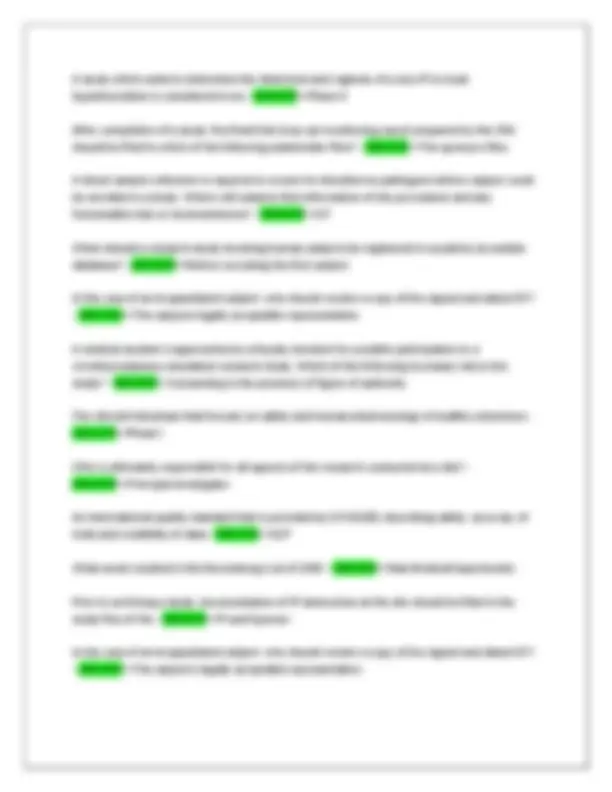
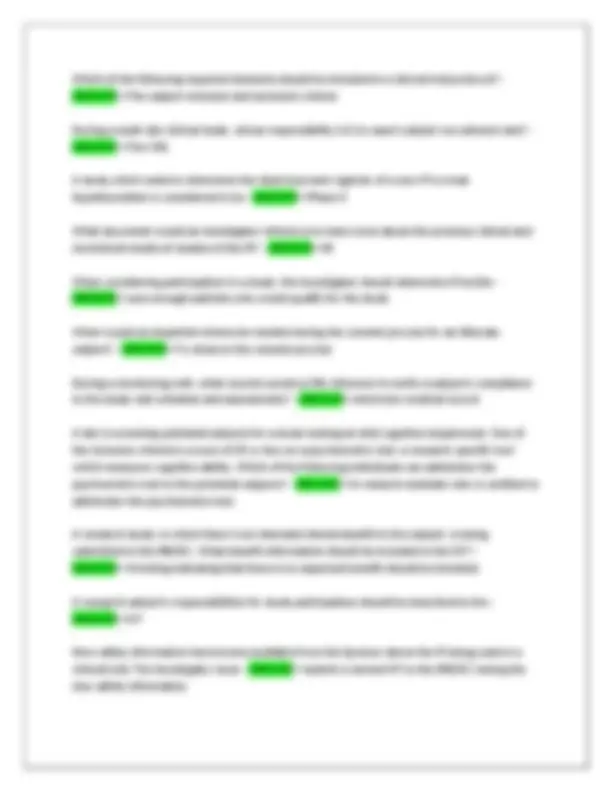
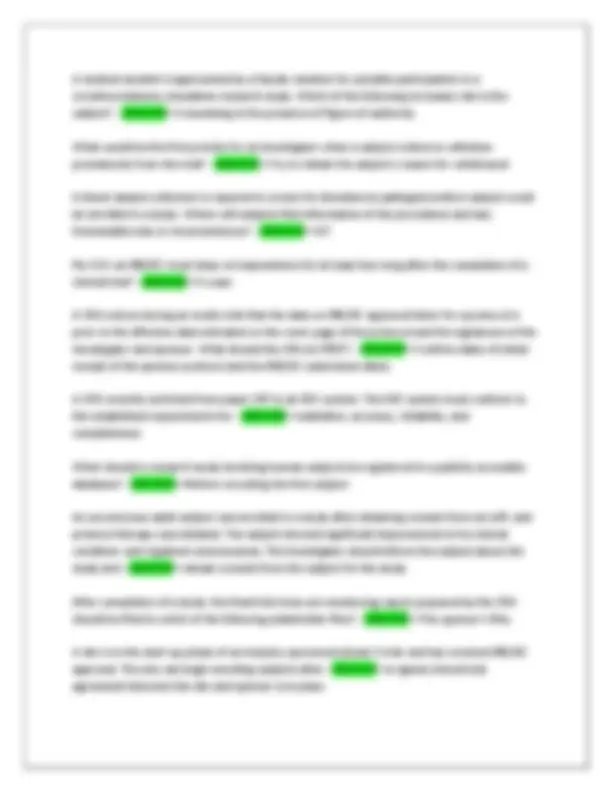
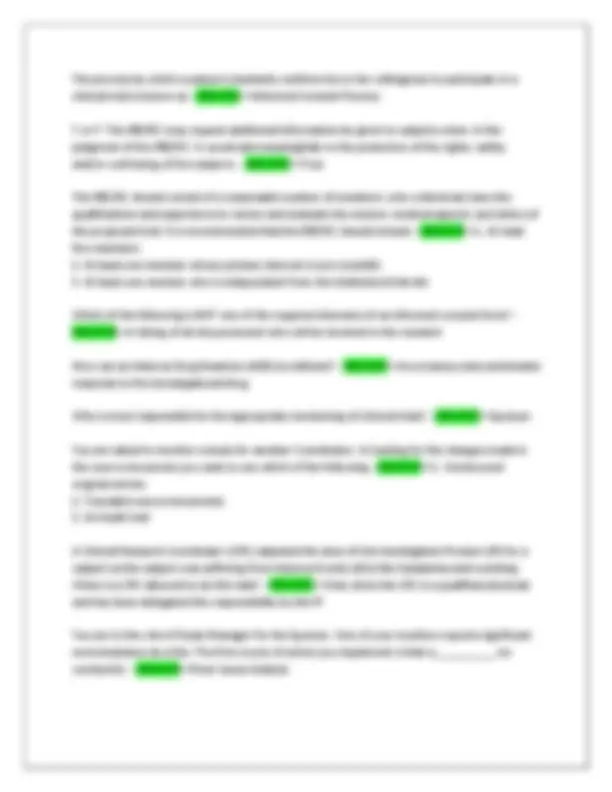
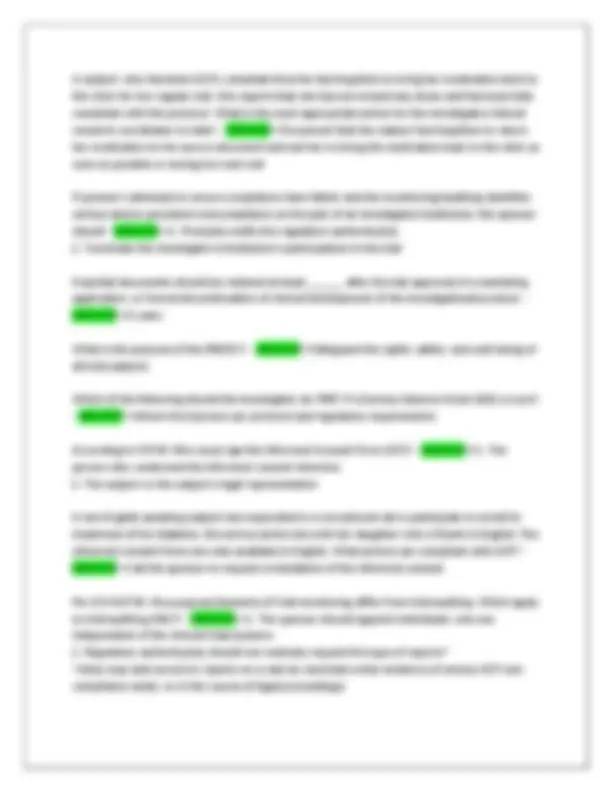
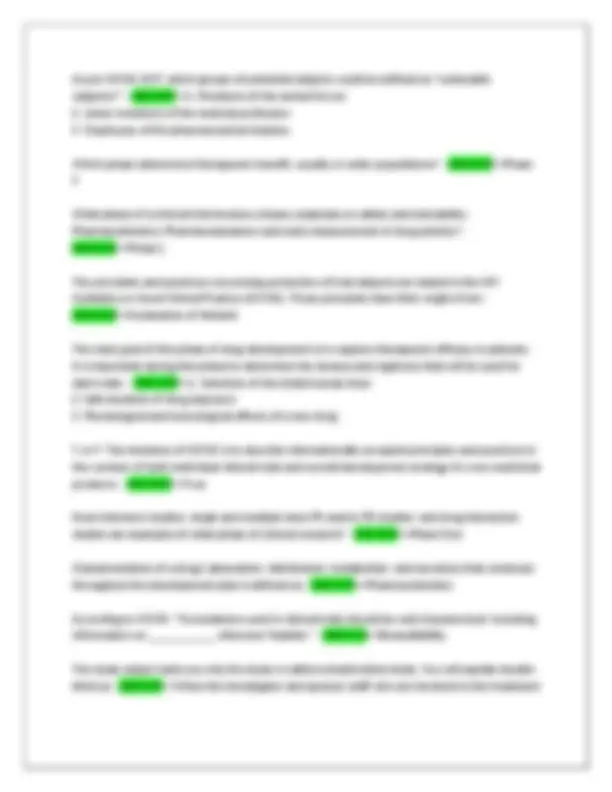
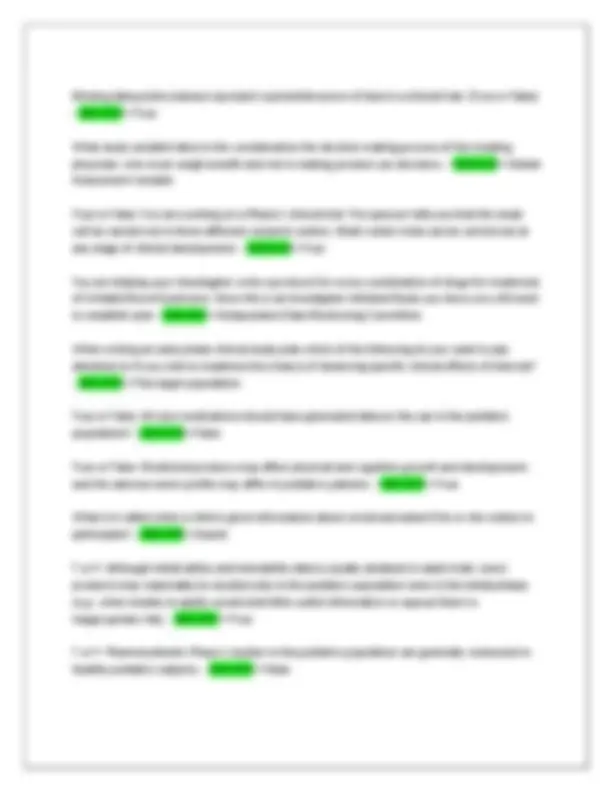
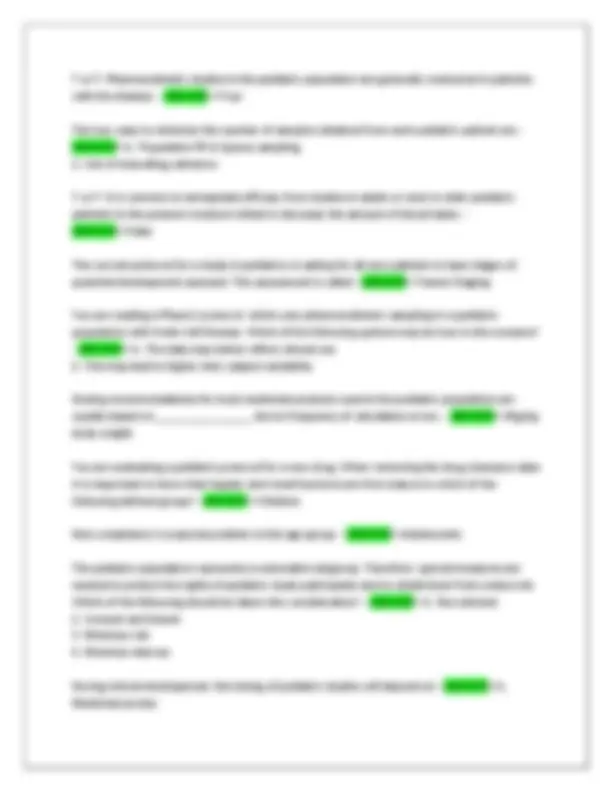
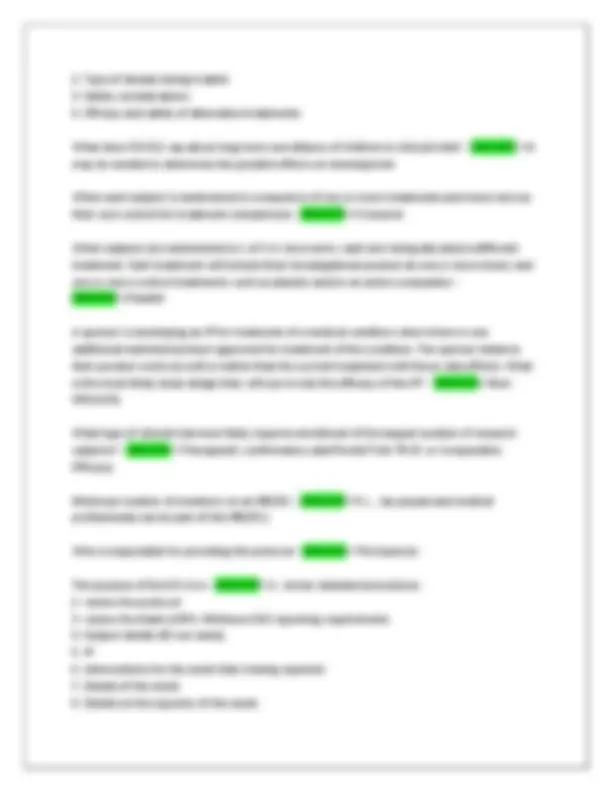
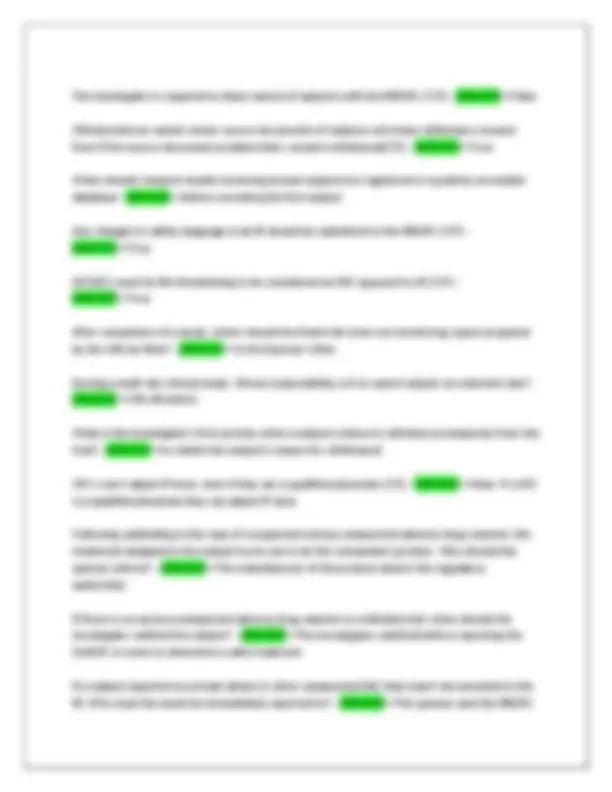
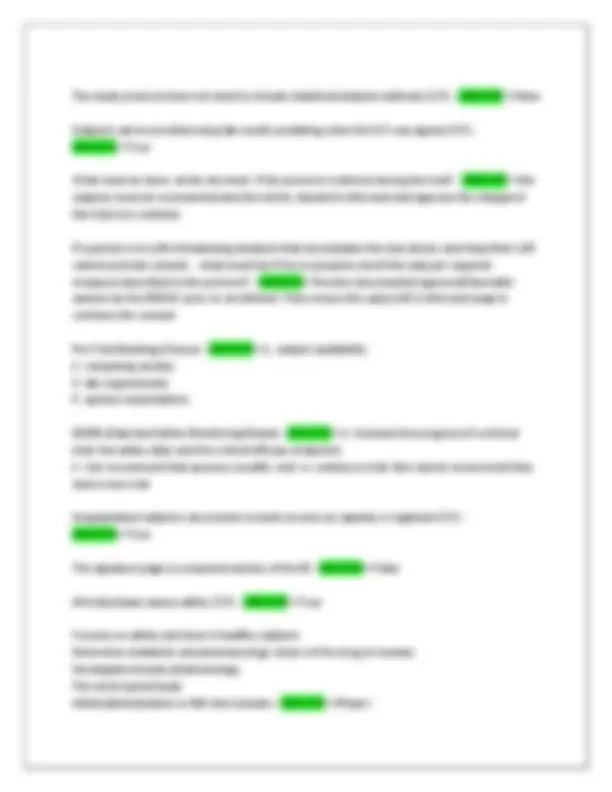
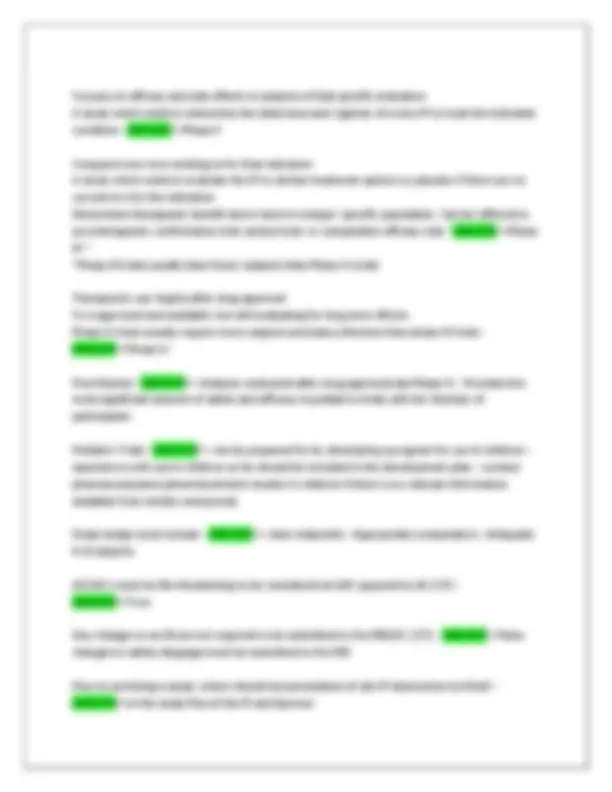
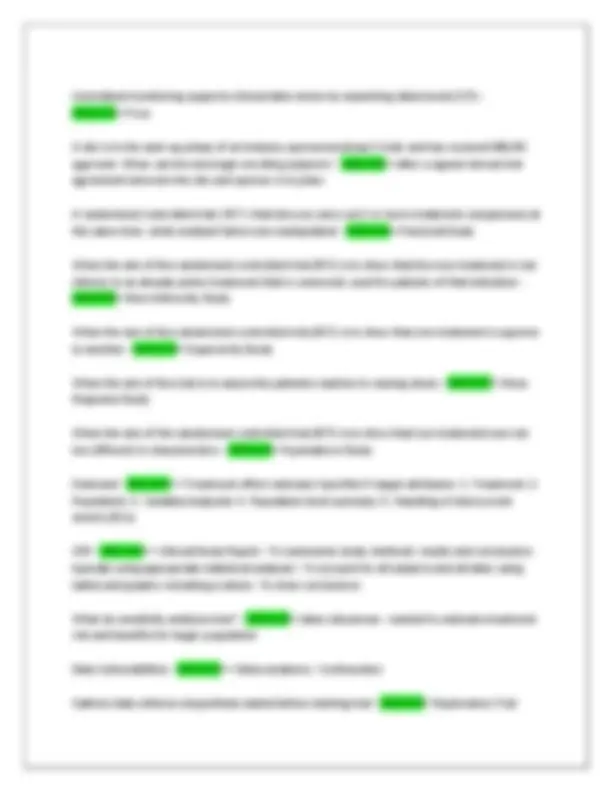
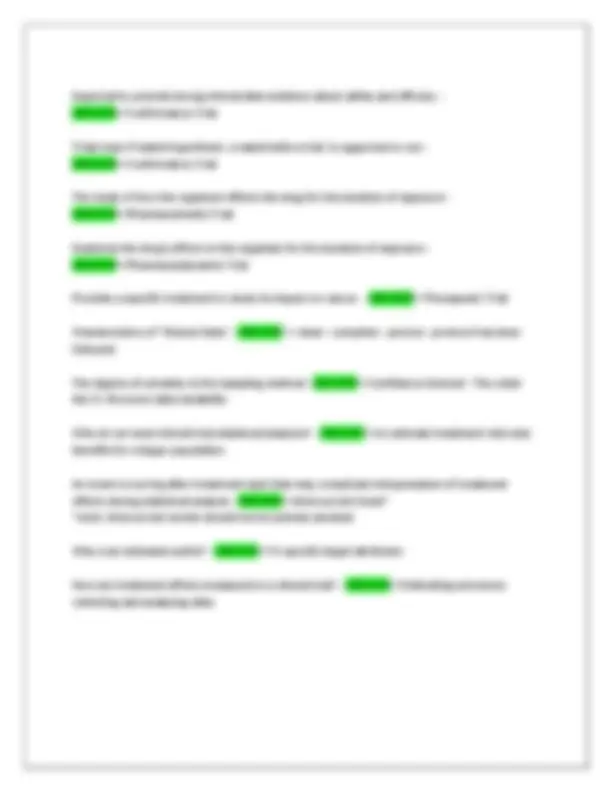


Study with the several resources on Docsity

Earn points by helping other students or get them with a premium plan


Prepare for your exams
Study with the several resources on Docsity

Earn points to download
Earn points by helping other students or get them with a premium plan
Community
Ask the community for help and clear up your study doubts
Discover the best universities in your country according to Docsity users
Free resources
Download our free guides on studying techniques, anxiety management strategies, and thesis advice from Docsity tutors
ACRP FINAL EXAM 2025 QUESTIONS AND ANSWERS
Typology: Exams
1 / 22

This page cannot be seen from the preview
Don't miss anything!















What would be the first priority for an investigator when a subject wishes to withdraw prematurely from the trial? - ANSWER>>Try to obtain the subject's reason for withdrawal.
CRO recently switched from paper CRF to an EDC system. The EDC system must conform to the established requirements for - ANSWER>>Validation Accuracy Reliability Completeness
Part of a sponsor's responsibility pertaining to electronic trial data handling is to - ANSWER>>maintain an audit trail, data trail, and edit trail.
A research subject's responsibilities for study participation should be described in the - ANSWER>>ICF
What document would an investigator reference to learn more about the previous clinical and nonclinical results of studies of the IP? - ANSWER>>Investigators brochure
During a multi site clinical study: whose responsibility is it to report subject recruitment rate? - ANSWER>>The CRA
An unconscious adult subject was enrolled in a study after obtaining consent from an LAR: and protocol therapy was initiated. The subject showed significant improvement in his clinical condition: and regained consciousness. The Investigator should inform the subject about the study and - ANSWER>>Obtain consent from the subject for the study
A site is in the start up phase of an industry sponsored phase 3 trial: and has received IRB approval. The site can begin enrolling subjects after... - ANSWER>>A signed clinical trial agreement between the site and sponsor is in place.
A site is screening potential subjects for a study looking at mild cognitive impairment. One of the inclusion criteria is a score of 25 or less on a psychometric test: a research specific tool which measures cognitive ability. Which of the following individuals can administer the
psychometric test to the potential subjects? - ANSWER>>A research assistant who is certified to administer the psychometric test
A research study: in which there is no intended clinical benefit to the subject: is being submitted to the IRB. What benefit information should be included in the ICF? - ANSWER>>Wording indicating that there is no expected benefit should be included
A CRA notices during an onsite visit that the date on IRB approval letter for a protocol is prior to the effective date indicated on the cover page of the protocol and the signatures of the investigator and sponsor. What should the CRA do FIRST? - ANSWER>>Confirm dates of initial receipt of the sponsor protocol and the IRB submission dates.
In a multi arm: randomized clinical trial: one arm of the protocol was terminated due to an increased risk of cancer in subjects. Who is responsible for providing a written report to the IRB? - ANSWER>>PI
Which of the following required elements should be included in a clinical trial protocol? - ANSWER>>Subject inclusion and exclusion criteria
Prior to archiving a study: documentation of IP destruction at the site should be filed in the study files of the - ANSWER>>PI and Sponsor
During a monitoring visit: what records would a CRA reference to verify a subject's compliance to the study visit schedule and assessments? - ANSWER>>Electronic medical record
When considering participation in a study: the investigator should determine if he... - ANSWER>>Sees enough patients who would qualify for the study
New safety information has become available from the Sponsor about the IP being used in a clinical trial. The investigator must - ANSWER>>Submit a revised ICF to the IRB noting the new safety information
Per ICH: an IRB must keep correspondence for at least how long after the completion of a clinical trial? - ANSWER>>3 Years
When would an impartial witness be needed during the consent process for an illiterate subject? - ANSWER>>To observe the consent process
Which of the following required elements should be included in a clinical trial protocol? - ANSWER>>The subject inclusion and exclusion criteria
During a multi-site clinical study: whose responsibility is it to report subject recruitment rate? - ANSWER>>The CRA
A study which seeks to determine the ideal dose and regimen of a new IP to treat hypothyroidism is considered to be - ANSWER>>Phase II
What document would an investigator reference to learn more about the previous clinical and nonclinical results of studies of the IP? - ANSWER>>IB
When considering participation in a study: the investigator should determine if he/she - ANSWER>>sees enough patients who would qualify for the study
When would an impartial witness be needed during the consent process for an illiterate subject? - ANSWER>>To observe the consent process
During a monitoring visit: what records would a CRA reference to verify a subject's compliance to the study visit schedule and assessments? - ANSWER>>electronic medical record
A site is screening potential subjects for a study looking at mild cognitive impairment. One of the inclusion criteria is a score of 25 or less on a psychometric test: a research-specific tool which measures cognitive ability. Which of the following individuals can administer the psychometric test to the potential subjects? - ANSWER>>A research assistant who is certified to administer the psychometric test
A research study: in which there is no intended clinical benefit to the subject: is being submitted to the IRB/IEC. What benefit information should be included in the ICF? - ANSWER>>Wording indicating that there is no expected benefit should be included.
A research subject's responsibilities for study participation should be described in the - ANSWER>>ICF
New safety information has become available from the Sponsor about the IP being used in a clinical trial. The Investigator must - ANSWER>>submit a revised ICF to the IRB/IEC noting the new safety information.
A medical student is approached by a faculty member for possible participation in a cricothyroidotomy simulation research study. Which of the following increases risk to the subject? - ANSWER>>Consenting in the presence of figure of authority
What would be the first priority for an investigator when a subject wishes to withdraw prematurely from the trial? - ANSWER>>Try to obtain the subject's reason for withdrawal.
A blood sample collection is required to screen for bloodborne pathogens before subject could be enrolled in a study. Where will subjects find information of the procedures and any foreseeable risks or inconveniences? - ANSWER>>ICF
Per ICH: an IRB/IEC must keep correspondence for at least how long after the completion of a clinical trial? - ANSWER>>3 years
A CRA notices during an onsite visit that the date on IRB/IEC approval letter for a protocol is prior to the effective date indicated on the cover page of the protocol and the signatures of the investigator and sponsor. What should the CRA do FIRST? - ANSWER>>Confirm dates of initial receipt of the sponsor protocol and the IRB/IEC submission dates.
A CRO recently switched from paper CRF to an EDC system. The EDC system must conform to the established requirements for - ANSWER>>validation, accuracy, reliability, and completeness.
When should a research study involving human subjects be registered in a publicly accessible database? - ANSWER>>Before recruiting the first subject
An unconscious adult subject was enrolled in a study after obtaining consent from an LAR: and protocol therapy was initiated. The subject showed significant improvement in his clinical condition: and regained consciousness. The Investigator should inform the subject about the study and - ANSWER>>obtain consent from the subject for the study.
After completion of a study: the final trial close-out monitoring report prepared by the CRA should be filed in which of the following stakeholder files? - ANSWER>>The sponsor's files
A site is in the start-up phase of an industry-sponsored phase 3 trial: and has received IRB/IEC approval. The site can begin enrolling subjects after - ANSWER>>a signed clinical trial agreement between the site and sponsor is in place.
In pre-market approval studies: all noxious and unintended responses to a medicinal product even possibly related to any dose should be considered - ANSWER>>Adverse Drug Reaction
You were just informed that you have a research patient that is receiving intensive treatment in an emergency room for allergic bronchospasm. This should be considered as - ANSWER>>A serious adverse event
After a Serious Adverse Event (SAE) has occurred: how should you list the subject identification on the immediate and follow-up reports? - ANSWER>>By their subject identification number
In which scenario would unblinding typically occur? - ANSWER>>When the investigator wants to make sure a particular subject is not randomized to placebo in the case of a Serious Adverse Event (SAE)
What is the timeframe for "expedited" reporting of serious: fatal or life-threatening: unexpected adverse drug reactions to regulatory authorities? - ANSWER>>As soon as possible, but no later than SEVEN calendar days after first knowledge of the event
The term "severe" in ICH is used to describe - ANSWER>>The Intensity of a specific event
All cases judged by either the reporting health care professional or the sponsor as having a reasonable suspected causal relationship to the medicinal product qualify as - ANSWER>>Adverse Drug Reactions
Which of the following criteria is described in ICH-GCP as necessary for classifying an Adverse Event (AE) as an Adverse Drug Reaction (ADR)? - ANSWER>>That a causal relationship is at least a reasonable possibility
A subject has a suspected serious adverse drug reaction with the outcome of death. Which are items that should be submitted to the Sponsor? - ANSWER>>1. A de-identified autopsy report: if available
What is the purpose of an initiation visit? - ANSWER>>1. To review the protocol
The process by which a subject voluntarily confirms his or her willingness to participate in a clinical trial is known as - ANSWER>>Informed Consent Process
T or F- The IRB/IEC may request additional information be given to subjects when: in the judgment of the IRB/IEC: it would add meaningfully to the protection of the rights: safety and/or well-being of the subjects. - ANSWER>>True
The IRB/IEC should consist of a reasonable number of members: who collectively have the qualifications and experience to review and evaluate the science: medical aspects: and ethics of the proposed trial. It is recommended that the IRB/IEC should include - ANSWER>>1. At least five members
Which of the following is NOT one of the required elements of an informed consent form? - ANSWER>>A listing of all site personnel who will be involved in the research
How can an Adverse Drug Reaction (ADR) be defined? - ANSWER>>As a noxious and unintended response to the investigational drug
Who is most responsible for the appropriate monitoring of clinical trials? - ANSWER>>Sponsor
You are asked to monitor a study for another Coordinator. In looking for the changes made in the source document you want to see which of the following - ANSWER>>1. Unobscured original entries
A Clinical Research Coordinator (CRC) adjusted the dose of the Investigation Product (IP) for a subject as the subject was suffering from Adverse Events (AEs) like headaches and vomiting. When is a CRC allowed to do this task? - ANSWER>>Only when the CRC is a qualified physician and has been delegated this responsibility by the PI
You are in the role of Study Manager for the Sponsor. One of your monitors reports significant noncompliance at a Site. The first course of action you implement is that a __________ be conducted. - ANSWER>>Root Cause Analysis
As per ICH E6 GCP: which groups of potential subjects could be defined as "vulnerable subjects?" - ANSWER>>1. Members of the armed forces
Which phase determines therapeutic benefit: usually in wider populations? - ANSWER>>Phase 3
What phase of a clinical trial involves a heavy emphasis on safety and tolerability: Pharmacokinetics: Pharmacodynamics and early measurement of drug activity? - ANSWER>>Phase 1
The principles and practices concerning protection of trial subjects are stated in the ICH Guideline on Good Clinical Practice (ICH E6). These principles have their origins from - ANSWER>>Declaration of Helsinki
The main goal of this phase of drug development is to explore therapeutic efficacy in patients. It is important during this phase to determine the dose(s) and regimens that will be used for later trials. - ANSWER>>1. Selection of the initial human dose
T or F- The intention of ICH E8 is to describe internationally accepted principles and practices in the conduct of both individual clinical trials and overall development strategy for new medicinal products. - ANSWER>>True
Dose-tolerance studies: single and multiple dose PK and/or PD studies: and drug interaction studies are examples of what phase of clinical research? - ANSWER>>Phase One
Characterization of a drug's absorption: distribution: metabolism: and excretion that continues throughout the development plan is defined as - ANSWER>>Pharmacokinetics
According to ICH E8: "Formulations used in clinical trials should be well characterized: including information on ___________ whenever feasible." - ANSWER>>Bioavailability
The study subject asks you why the study is called a double blind study. You will explain double blind as - ANSWER>>When the Investigator and sponsor staff who are involved in the treatment
or clinical evaluation of the subjects and analysis of data are unaware of the treatment assignments
According to ICH E8 what type of study would have the following elements? Adequate: and well controlled studies to establish efficacy - ANSWER>>1. Randomized parallel dose response studies
Your Investigator wants to participate in a Phase 3 Pharmacokinetics study. Pharmacokinetic studies are commonly conducted in later phases to ANSWER what questions? - ANSWER>>1. Food effects on bioavailability
A trial where the treatment assignment is not known by the study participant because of the use of placebo or other methods of masking the intervention: but the study team knows - ANSWER>>Single blind
A new study is investigating a new IND "glue" that can be used to hold skin cuts together and decrease the chance of scaring. You know children should be included because ICH E8 considers them a special population. In designing the protocol you should expect to - ANSWER>>Include children in the general plan from the beginning
Per ICH E8: methods used to evaluate patient usage of the test drug should be - ANSWER>>Specified in the protocol and actual usage documented
Which trial design is used for the specific purpose of examining the interaction of A and B? - ANSWER>>Factorial design
T or F- The Data and Safety Monitoring Board (DSMB) is a separate entity from an Institutional Review Board (IRB) or an Independent Ethics Committee (IEC)? - ANSWER>>True
What is the purpose of the "Data and Safety Monitoring Board (DSMB)?" - ANSWER>>To assess the progress of a clinical trial: the safety data: and the critical efficacy endpoints
Missing data points (values) represent a potential source of bias in a clinical trial. (True or False)
What study variable takes in the consideration the decision making process of the treating physician: who must weigh benefit and risk in making product use decisions. - ANSWER>>Global Assessment Variable
True or False- You are working on a Phase 1 clinical trial. The sponsor tells you that the study will be carried out in three different research centers. Multi-center trials can be carried out at any stage of clinical development. - ANSWER>>True
You are helping your Investigator write a protocol for a new combination of drugs for treatment of Irritable Bowel Syndrome. Since this is an Investigator Initiated Study you know you will need to establish a/an - ANSWER>>Independent Data Monitoring Committee
When writing an early phase clinical study plan which of the following do you want to pay attention to if you wish to maximize the chance of observing specific clinical effects of interest?
True or False- All new medications should have generated data on the use in the pediatric population? - ANSWER>>False
True or False- Medicinal products may affect physical and cognitive growth and development: and the adverse event profile may differ in pediatric patients. - ANSWER>>True
What is it called when a child is given information about a trial and asked if he or she wishes to participate? - ANSWER>>Assent
T or F- Although initial safety and tolerability data is usually obtained in adult trials: some products may reasonably be studied only in the pediatric population even in the initial phases (e.g.: when studies in adults would yield little useful information or expose them to inappropriate risk). - ANSWER>>True
T or F- Pharmacokinetic Phase 1 studies in the pediatric population are generally conducted in healthy pediatric subjects. - ANSWER>>False
T or F- Pharmacokinetic studies in the pediatric population are generally conducted in patients with the disease. - ANSWER>>True
The two ways to minimize the number of samples obtained from each pediatric patient are - ANSWER>>1. Population PK & Sparse sampling
T or F- It is common to extrapolate efficacy from studies in adults or even in older pediatric patients to the preterm newborn infant to decrease the amount of blood taken. - ANSWER>>False
The current protocol for a study in pediatrics is asking for all new patients to have stages of pubertal development assessed. This assessment is called - ANSWER>>Tanner Staging
You are reading a Phase 2 protocol: which uses pharmacokinetic sampling in a pediatric population with Sickle Cell Disease. Which of the following options may be true in this scenario?
Dosing recommendations for most medicinal products used in the pediatric population are usually based on ________________ due to frequency of calculation errors. - ANSWER>>Mg/kg body weight
You are evaluating a pediatric protocol for a new drug. When reviewing the drug clearance data it is important to know that hepatic and renal functions are first mature in which of the following defined group? - ANSWER>>Children
Non-compliance is a special problem in this age group. - ANSWER>>Adolescents
The pediatric population represents a vulnerable subgroup. Therefore: special measures are needed to protect the rights of pediatric study participants and to shield them from undue risk. Which of the following should be taken into consideration? - ANSWER>>1. Recruitment
During clinical development: the timing of pediatric studies will depend on - ANSWER>>1. Medicinal produc
Vulnerable subjects - ANSWER>>1. Junior members of the medical profession
IRB/IEC Evaluates - ANSWER>>1. The rights: safety: and well-being of the subjects participating in the trial
Serious Adverse Event (SAE) - ANSWER>>1. Results in death: is life threatening
Adverse Drug Reaction (ADR) - ANSWER>>1. All noxious and unintended response that is related to any dose
Not observed before. Or the Event occurred more often than previously observed - ANSWER>>Unexpected Event
Adverse Event (AE) - ANSWER>>1. Any untoward medical occurrence that does not necessarily have a causal relationship with treatment
Non-Clinical Study - ANSWER>>1. Not conducted on human subjects
Data Safety and Monitoring Board (DSMB) - ANSWER>>1. Assesses the progress of a clinical trial: the safety data: and the critical efficacy endpoints
WMA - ANSWER>>World Medical Association
Declaration of Helsinki - ANSWER>>-Created by WMA in 1964: - Defines the ethical principles for medical research involving human subjects
LAR - ANSWER>>Legally Acceptable Representative. (regarding consenting procedures)
International Conference on Harmonization (ICH) - ANSWER>>Mission is to provide a unified standard for Europe: US: and Japan to facilitate the acceptance of clinical trials
Expected AEs - ANSWER>>Those that are consistent with the product information and were present on previous and preclinical trials
Contents of the site TMF - ANSWER>>1. IP accountability records
Per ICH: how long must an IRB/IEC keep correspondence for after the completion of a clinical trial - ANSWER>>at least 3 years
The signature page is an optional section of the IB (T/F) - ANSWER>>True
Incapacitated subjects can provide consent as soon as capacity is regained (T/F) - ANSWER>>True
Who should send Annual Progress Reports to the IRB/IEC - ANSWER>>The Investigator
The study protocol does not need to include statistical analysis methods (T/F) - ANSWER>>False
Subjects can be enrolled using lab results predating when the ICF was signed (T/F) - ANSWER>>True
What must be done: at the site level: if the protocol is altered during the trial? - ANSWER>>the subjects must be reconsented and the irb/iec should be informed and approve the changes if the trial is to continue
If a person is in a life threatening situation that necessitates the test article: and they/their LAR cannot provide consent... what must the PI do to properly enroll the subj per required measures described in the protocol? - ANSWER>>Receive documented approval/favorable opinion by the IRB/IEC prior to enrollment. Then ensure the subjs LAR is informed asap to continue the consent
Pre-Trial Meetings Discuss - ANSWER>>1. subject availability
DSMB (Data and Safety Monitoring Board) - ANSWER>>1. Assesses the progress of a clinical trial: the safety data: and the critical efficacy endpoints
Incapacitated subjects can provide consent as soon as capacity is regained (T/F) - ANSWER>>True
The signature page is a required section of the IB - ANSWER>>False
All trial phases assess safety (T/F) - ANSWER>>True
Focuses on safety and dose in healthy subjects Determine metabolic and pharmacologic action of the drug in humans Investigates human pharmacology The most typical study Initial administration or IND into humans - ANSWER>>Phase I
Focuses on efficacy and side effects in subjects of that specific indication A study which seeks to determine the ideal dose and regimen of a new IP to treat the indicated condition - ANSWER>>Phase II
Compares new tx to existing tx for that indication A study which seeks to evaluate the IP to similar treatment options or placebo if there are no current tx's for the indication Determines therapeutic benefit and is done in a larger: specific population. Can be reffered to as a therapeutic confirmatory trial: pivotol trial: or comparative efficacy trial - ANSWER>>Phase III * *Phase III trials usually have fewer subjects than Phase IV trials
Therapeutic use: begins after drug approval Tx is approved and available: but still evaluating for long term effects Phase IV trials usually require more subjects and data collection than phase III trials - ANSWER>>Phase IV
Post Market - ANSWER>>-Analysis conducted after drug approval aka Phase IV: - Provides the most significant amount of safety and efficacy in pediatrics trials with ltd. Number of participants
Pediatric Trials - ANSWER>>-can be prepared for by developing a program for use in children: - experience with use in children so far should be included in the development plan: - conduct pharmacodynamic/pharmacokinetic studies in children if there is no relevant information available from similar compounds
Study design must include - ANSWER>>-clear endpoints: - Appropriate comparators: - Adequate
All SAE's must be life-threatening to be considered an SAE opposed to AE (T/F) - ANSWER>>True
Any changes to an IB are not required to be submitted to the IRB/IEC (T/F) - ANSWER>>False. changes to safety language must be submitted to the IRB
Prior to archiving a study: where should documentation of site IP destruction be filed? - ANSWER>>in the study files of the PI and Sponsor